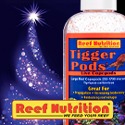 Unless you walk around with your head firmly planted between your posterior set of cheeks, you’ve probably noticed the current trend towards more organic foods and products. The reason for this craze is that all those added chemicals designed to increase shelf life or make things taste better may be slowly destroying our bodies. While the prospect of never worrying about my post apocalyptic twinkie stash going bad is comforting, the thought of what living off the fluffy yellow dyed pastries would do to me is frightening. If we’re becoming more conscious of what we put in our bodies is it such a stretch to put the same thought into what we put in our tanks?
Unless you walk around with your head firmly planted between your posterior set of cheeks, you’ve probably noticed the current trend towards more organic foods and products. The reason for this craze is that all those added chemicals designed to increase shelf life or make things taste better may be slowly destroying our bodies. While the prospect of never worrying about my post apocalyptic twinkie stash going bad is comforting, the thought of what living off the fluffy yellow dyed pastries would do to me is frightening. If we’re becoming more conscious of what we put in our bodies is it such a stretch to put the same thought into what we put in our tanks?
If you walk into most pet stores you will find aisle after aisle of products all claiming to eliminate some aspect of your duties in caring for the tank or adding something that is otherwise lacking. Some work as claimed, while others may do nothing but foul the tank. The one thing they all have in common is that none of them have any standard or organization they answer to in order to be legally sold. Basically, any company that wants to put out a product can make whatever claims they want on the bottle since most are difficult if not impossible for the home user to check. Reef tanks are a delicate balance of elements and biological processes that occur naturally and it doesn’t take much to upset that balance.
So with people becoming more aware of what we choose to consume, why wouldn’t the same apply to what we put in our tanks? It sometimes seems like a lot of hobbyists are doing everything in their power to sabotage their reef by adding these products based solely on the companies’ claims. Of all the tanks I’ve seen, the most stable and healthy systems tend to follow a more natural regimen with few additives beyond trace elements. If you go to where you store your additives and you need more than two hands to count the number of bottles, then odds are you would be better off tossing a few of them and just sticking to the basics. I’m not saying you should go organic with your reef, but be more discerning when choosing what gets poured in. I’m sure if we all take a moment to look back at all the different additives we’ve purchased, we can think of more than one that just didn’t do what was promised.
When new products hit the market I tend to hang back for a little while and see what everyone else is saying about it before I start testing it for myself. Nothing goes in my tanks unless I am sure the display will benefit from it. There are just too many “Me Too” companies and snake oil producers out there. Proper maintenance is far superior (and easier) to anything you can buy in a bottle. Most of the bottles on that shelf are just an expensive setback that puts you in a situation where you feel the need to try something else to repair the damage done by the last one. Regulation is almost nonexistent, so the responsibility falls on you to make the proper choices and being cynical can go a long way in achieving success.










Well said. I think good tips are to stick with the big companies who have already built a reputation, and if it doesn’t say what the product is either in the title or right below it, don’t try it. Things like “calcium” or “buffer” are pretty strait forward, but stay away from things like “reef in a bottle.” I really believe the average reef should go beyond code a and b chemicals.
*shouldn’t go beyond code a and b
If you really want to get into it, not even all buffers are safe because some will precipitate calcium. Even some of the good companies have their share of questionable products. It really comes down to reading bottles and being able to put it back down without carrying it to the check out. “I might as well try it.” should be lumped in with “Hold my beer I have an idea.” both usually end in tears.